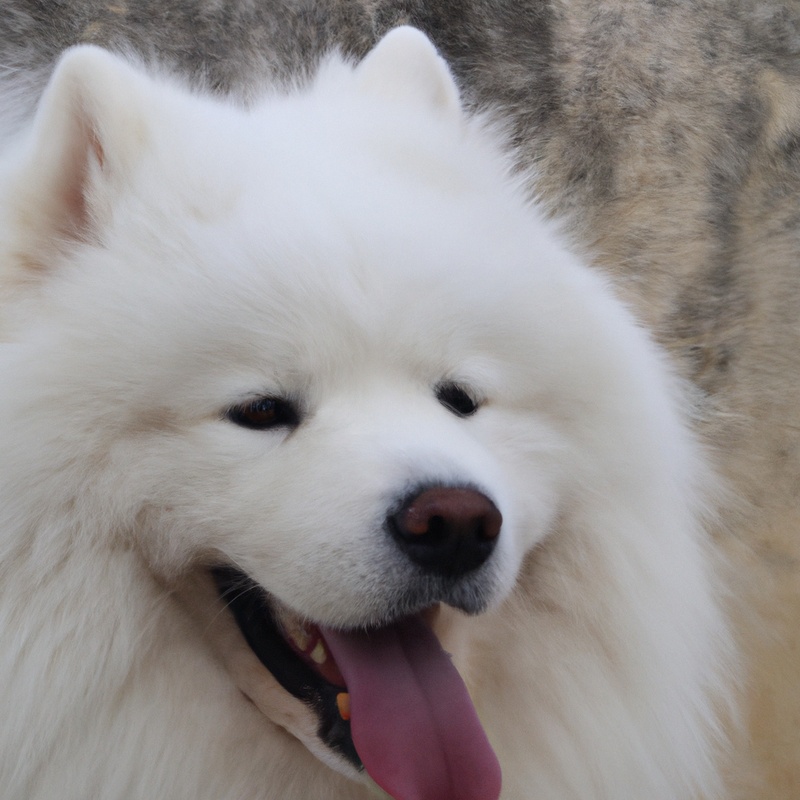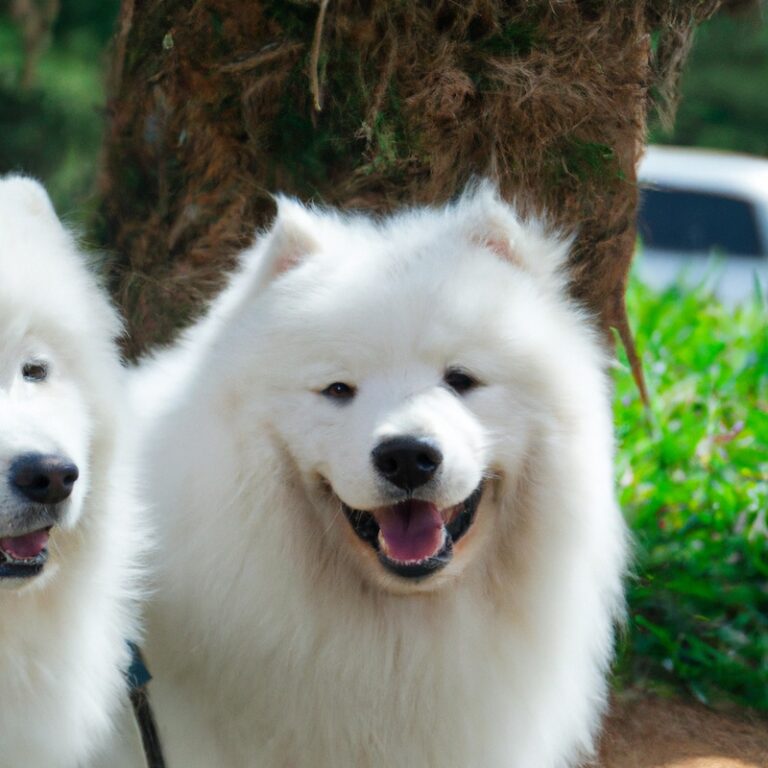Common Samoyed Behavioral Issues And Solutions – A Guide for Every Samoyed Owner
Key Takeaways:
- Socialization is crucial for Samoyeds to prevent behavioral issues.
- Separation anxiety is a common concern in Samoyeds, requiring proper training and gradual alone time.
- Consistent and positive reinforcement training methods are effective in addressing behavioral issues in Samoyeds.
- Providing mental and physical stimulation helps alleviate boredom, a possible cause of behavioral problems in Samoyeds.
Hey there! Are you the proud owner of a Samoyed or considering getting one? Well, let me tell you, these fluffy white bundles of joy can bring so much love and happiness to your life.
However, like any other dog breed, Samoyeds can also have their fair share of behavioral issues.
From excessive barking to destructive chewing, aggression, and anxiety, it’s important to understand and address these challenges to ensure a happy and harmonious relationship with your furry friend. But fear not! In this article, I’ll walk you through the most common behavioral issues faced by Samoyeds and offer practical solutions to overcome them.
So, let’s dive in and help you shape your Samoyed into the perfect companion!
| Behavioral Issue | Solution |
|---|---|
| Separation Anxiety | 1. Gradual desensitization and counterconditioning techniques 2. Providing mental and physical stimulation before leaving 3. Using calming aids like pheromone diffusers or anxiety wraps |
| Barking | 1. Training the “quiet” command 2. Redirecting attention to a toy or treat 3. Consistent rewards for quiet behavior |
| Chewing | 1. Providing appropriate chew toys 2. Regular exercise to release excess energy 3. Supervising and redirecting attention towards toys 4. Using taste deterrent sprays on household items |
| Jumping | 1. Ignoring the dog until it calms down 2. Training and reinforcing the “off” command 3. Redirecting jumping behavior towards acceptable alternatives |
| Pulling on the Leash | 1. Consistent leash training with rewards for loose leash walking 2. Using a front-clip harness or no-pull harness 3. Practicing leash walking skills in low-distraction environments |
Understanding Samoyed Behavior
Common behavioral issues in Samoyeds
Samoyeds, like any other breed, can sometimes exhibit certain behavioral issues. Some common ones include excessive barking, separation anxiety, and improper socialization.
Barking can be managed through consistent training and providing mental stimulation.
Separation anxiety can be reduced by gradually increasing the time you spend away from your Samoyed and providing them with engaging toys. Proper socialization from a young age is crucial to prevent fear-based aggression and shyness.
It’s important to seek professional help if these issues persist.
Factors influencing Samoyed behavior
There are several factors that can influence the behavior of Samoyed dogs.
One of the main factors is their genetics, as certain traits may be more prevalent in certain bloodlines.
Additionally, their environment plays a big role.
If a Samoyed is raised in a loving and positive environment, they are more likely to have good behavior.
Training and socialization also play key roles in shaping their behavior.
A well-trained and socialized Samoyed is more likely to exhibit desirable behavior.
Lastly, health issues can also impact behavior.
Pain or discomfort can cause a Samoyed to act out.
By considering these factors, you can understand and address any behavioral issues your Samoyed may have.
Socialization and Training
Importance of early socialization
Early socialization is key for a Samoyed’s well-being. It helps them become well-adjusted and confident adults.
By exposing them to various people, animals, and environments during their critical developmental period, you can prevent behavior issues like fearfulness and aggression.
It also helps them learn how to cope with new situations and stimuli calmly. Proper socialization creates a foundation for a happy and social dog that will be a pleasure to have as part of your family.
Positive reinforcement training for Samoyeds
Positive reinforcement training is highly effective for Samoyeds. It involves rewarding desired behaviors with treats, praise, or playtime.
This helps them associate good behavior with positive experiences.
To start, use treats or praise to reward your Samoyed when they display a desired behavior, such as sitting or walking calmly on a leash. Be consistent and patient, focusing on positive reinforcement rather than punishment.
Break training into short sessions, keeping them fun and engaging.
Use high-value treats and toys as rewards to keep your Samoyed motivated. Remember, consistency and positive reinforcement will help your Samoyed learn and thrive.
Addressing separation anxiety
Addressing separation anxiety in your Samoyed requires patience and consistency. Start by gradually getting your dog used to being alone.
Leave for short periods and gradually increase the duration.
Use positive reinforcement training to reward calm behavior when you leave and return. Provide plenty of mental and physical stimulation to keep your Samoyed occupied while you’re away.
Consider using interactive toys and puzzles or enrolling your dog in doggie daycare.
Consulting with a professional dog trainer or behaviorist can also provide valuable guidance in addressing separation anxiety.
Excessive Barking and Destructive Chewing
Understanding the reasons behind excessive barking
Understanding the reasons behind excessive barking in Samoyeds can help address this behavior. Some common causes include boredom, attention-seeking, anxiety, fear, territorial instincts, or medical issues.
It’s important to pinpoint the specific trigger to effectively tackle the problem.
Providing mental and physical stimulation, consistent training, creating a safe environment, and seeking veterinary advice if necessary can help curb excessive barking in Samoyeds.

Techniques to reduce barking in Samoyeds
To reduce barking in Samoyeds, try these techniques:
- Provide mental and physical stimulation: Engage your Samoyed in regular exercise, such as daily walks or playtime, to help prevent boredom and excess energy that may lead to barking.
- Use positive reinforcement training: Reward your Samoyed for quiet behavior with treats and praise. Teach them commands like “quiet” or “speak” to control their barking.
- Address the underlying cause: Identify and address any triggers that may be causing excessive barking, such as separation anxiety or fear. Consult with a professional dog trainer or behaviorist for guidance.
- Create a calm environment: Minimize potential sources of stress or excitement, such as loud noises or unfamiliar visitors. Establish a routine and provide a comfortable space for your Samoyed to relax.
- Consider anti-barking devices: Utilize tools like citronella collars, ultrasonic devices, or indoor noise filters to discourage excessive barking. Ensure these devices are used responsibly and in conjunction with positive reinforcement training.
Remember that each Samoyed is unique, so it may take time and patience to find the best approach for your furry friend.
Celebrate small victories and stay consistent with your training efforts!
Curbing destructive chewing behavior in Samoyeds
To curb destructive chewing behavior in Samoyeds, provide plenty of appropriate chew toys and bones to redirect their chewing. Avoid leaving valuable items within their reach and create a safe, designated space for them when unsupervised.
Consistently reinforce the “leave it” and “drop it” commands during training.
Establish a routine that includes regular exercise and mental stimulation to prevent boredom, which can contribute to destructive chewing. Seek professional guidance if the behavior persists.
Remember, consistency and patience are key in addressing this issue.

Aggression and Reactivity
Identifying types of aggression in Samoyeds
Identifying types of aggression in Samoyeds can help you understand their behavior better.
Some common types of aggression in Samoyeds include fear aggression, territorial aggression, food aggression, and defensive aggression.
Fear aggression occurs when a dog feels threatened or scared, while territorial aggression arises when a dog wants to protect its space.
Food aggression can be seen when a Samoyed becomes possessive over its food, and defensive aggression happens when a Samoyed feels the need to protect itself.
By being aware of these types of aggression, you can work on training and socializing your Samoyed to prevent or manage aggressive behaviors.
Managing aggression through behavior modification
Managing aggression through behavior modification is a key approach to address this issue. Firstly, it’s important to understand the root causes of the aggression.
Through proper observation and analysis, you can identify triggers and patterns that lead to the aggressive behavior.
Once you have a clear understanding, you can focus on implementing positive reinforcement and reward-based training techniques. This involves rewarding desired behaviors while redirecting and discouraging aggressive behaviors.
Consistency and patience are vital in this process.
Remember to consult with a professional dog trainer or behaviorist for guidance and support.
Dealing with reactivity towards other dogs or strangers
Dealing with reactivity towards other dogs or strangers can be challenging but manageable. Here are a few tips to help you in such situations:
- Start with socialization: Expose your dog to different environments, people, and other dogs from an early age. Gradually increase difficulty levels to build their confidence and reduce reactivity.
- Use positive reinforcement: Reward your dog for calm and relaxed behavior around other dogs or strangers. This will help them associate positive experiences with these situations.
- Desensitization and counterconditioning: Gradually expose your dog to triggers at a safe distance and reward them for calm behavior. Over time, decrease the distance and continue rewarding positive responses.
- Seek professional help: If your dog’s reactivity persists or worsens, consider consulting a professional dog trainer or behaviorist. They can provide tailored guidance and techniques to address specific issues.
Remember, patience and consistency are key when dealing with reactivity. Understand your dog’s needs and work at their own pace to help them overcome these challenges.

Anxiety and Fearfulness
Recognizing signs of anxiety and fear in Samoyeds
Recognizing signs of anxiety and fear in Samoyeds can be important for their well-being.
Here are some common signs to look out for:
- Restlessness or pacing: If your Samoyed is constantly moving around or seems unable to settle, it could be a sign of anxiety or fear.
- Excessive panting or drooling: Dogs may pant or drool more when they are anxious or fearful, so keep an eye out for excessive drooling or panting in your Samoyed.
- Trembling or shaking: Shaking or trembling can be a physical manifestation of anxiety or fear in Samoyeds.
- Avoidance behaviors: If your Samoyed tries to avoid certain situations, people, or places, it may indicate fear or anxiety.
- Excessive barking or growling: Anxiety or fear can cause Samoyeds to become more vocal and exhibit excessive barking or growling.
- Aggression: In some cases, anxiety and fear can trigger aggressive behaviors in Samoyeds, so it’s essential to be aware of any signs of aggression.
Remember, recognizing these signs is the first step towards helping your Samoyed manage their anxiety or fear.
If you notice any of these behaviors, it’s best to consult with a professional veterinarian or animal behaviorist to develop a suitable plan of action.
Creating a safe and comforting environment
To create a safe and comforting environment for your Samoyed, here are a few things to keep in mind:
- Provide a designated space: Give your Samoyed a specific area in your home where they can retreat to when they feel anxious or overwhelmed. This could be a crate, a cozy corner with a bed, or a quiet room.
- Maintain a routine: Dogs thrive on structure, so stick to a daily routine that includes regular feeding, exercise, and playtime. Predictability and stability can help reduce their anxiety.
- Socialize and expose them to new experiences: Introduce your Samoyed to different people, places, and objects from a young age. This will help them feel more comfortable in new situations and prevent them from becoming fearful or agitated.
- Use positive reinforcement: Reward good behavior with treats, praise, and affection. This will create a positive association and build trust between you and your Samoyed.
- Avoid punishment: Punishment can escalate fear and anxiety in your Samoyed, so focus on positive reinforcement instead. Redirect undesired behaviors and provide alternatives.
Creating a safe and comforting environment for your Samoyed is essential for their well-being and happiness.
Using desensitization and counter-conditioning for anxiety
To address anxiety in dogs, it’s effective to use desensitization and counter-conditioning techniques.
Desensitization involves gradually exposing your dog to the things that trigger their anxiety, starting with a low level of exposure and gradually increasing it over time.
Counter-conditioning involves pairing the anxiety-inducing stimuli with positive experiences or rewards to change your dog’s emotional response.
By consistently using these methods and seeking professional guidance if needed, you can help your dog overcome their anxiety.
Excessive Energy and Hyperactivity
Providing physical and mental stimulation for Samoyeds
To keep your Samoyed happy and balanced, providing both physical and mental stimulation is essential.
Here are some tips:
- Daily exercise: Samoyeds are energetic dogs that love to run and play. Take them for brisk walks, engage in active play sessions, or consider activities like agility training or hiking.
- Mental challenges: Samoyeds are intelligent and thrive on mental stimulation. Use puzzle toys, obedience training sessions, and interactive games to keep their minds active.
- Socialization: Samoyeds are social animals and enjoy the company of humans and other dogs. Regular socialization with other dogs and exposure to different environments is important for their well-being.
- Enriched environment: Create a stimulating environment with chew toys, interactive feeding toys, and different textures to explore. Rotate toys regularly to keep them interested.
- Training sessions: Samoyeds love learning, so engage in regular training sessions to provide mental stimulation and strengthen the bond between you and your dog.
Remember, every Samoyed is unique, so observe their preferences and adapt the activities accordingly.
Regular physical and mental stimulation will help prevent behavioral issues and ensure a happy, well-rounded companion.
Structured exercise and playtime routines
Structured exercise and playtime routines are essential for maintaining a happy and well-behaved Samoyed. Here are a few tips:
- Engage in daily walks or runs to provide physical exercise and mental stimulation.
- Incorporate interactive toys and games like fetch or hide-and-seek to keep them entertained.
- Set aside regular play sessions for bonding and socialization.
- Consider enrolling your Samoyed in obedience or agility classes to challenge them and provide a structured environment.
- Vary their exercise routine to keep it interesting and prevent boredom.
Remember, a tired Samoyed is a well-behaved Samoyed!
Channeling excess energy into productive outlets
If you have a Samoyed that has a lot of excess energy, it’s important to find ways to channel that energy into productive outlets. One way is through regular exercise such as daily walks or runs.
Engaging in mental stimulation activities like obedience training or puzzle toys can also help keep your Samoyed occupied and focused.
Another option is to provide them with interactive toys or games that require problem-solving or physical activity. Overall, finding activities that engage your Samoyed’s body and mind can help them expend their energy in a positive and productive way.
Frequently Asked Questions (FAQs)
How can I stop my Samoyed from digging?
If you want to stop your Samoyed from digging, there are a few strategies you can try. First, provide your pup with plenty of exercise to tire them out and reduce their urge to dig.
Additionally, create a designated digging area in your yard filled with sand or loose soil where they can dig to their heart’s content.
Redirect their attention with interactive toys and puzzles to keep them mentally stimulated. Finally, make sure your Samoyed has plenty of toys and chew bones to prevent boredom.
Remember, consistency and positive reinforcement are key!
What should I do if my Samoyed shows aggression towards other dogs?
If your Samoyed shows aggression towards other dogs, it’s important to address the issue promptly. Here are a few steps you can take:
- Seek professional help: Consult with a professional dog trainer or behaviorist who specializes in aggression. They can assess the situation and provide guidance tailored to your specific dog.
- Identify triggers: Pay attention to what triggers your Samoyed’s aggression. Is it certain types of dogs, certain situations, or specific behaviors? Understanding the triggers can help you manage and avoid them.
- Gradual socialization: Introduce your Samoyed to other dogs in controlled settings, such as obedience classes or playgroups. Start with calm, well-behaved dogs and work towards more challenging interactions as your dog gains confidence and control.
- Use positive reinforcement: Reward your Samoyed for calm and appropriate behavior around other dogs. Reinforcing positive behaviors can help reduce the aggression over time.
- Avoid punishment: Avoid using punishment-based training methods as they can increase fear and aggression. Instead, focus on positive reinforcement and redirection techniques.
- Continue training and consistency: Consistency is key in modifying behavior. Continue training sessions, practice obedience commands, and reinforce good behavior throughout your dog’s life.
Remember, addressing aggression requires patience and time. With proper guidance, training, and socialization, you can help your Samoyed overcome their aggression towards other dogs.
How can I prevent separation anxiety in my Samoyed?
To prevent separation anxiety in your Samoyed, establish a consistent routine and gradually increase their alone time.
Provide engaging toys and puzzles to keep them occupied, and consider crate training to create a safe space for them.
Gradual desensitization to being alone can be done by leaving for short periods and gradually increasing the duration.
Offer plenty of exercise and mental stimulation to help release energy and reduce anxiety.
Final Verdict
Understanding Samoyed behavior is crucial for providing them with a happy and well-adjusted life. By addressing common behavioral issues such as excessive barking, destructive chewing, aggression, anxiety, and hyperactivity, we can help our Samoyeds thrive.
Early socialization, positive reinforcement training, and creating a safe environment are key to tackling these challenges.
Remember, consistency, patience, and love are vital in guiding our Samoyeds towards better behavior. With the right knowledge and techniques, we can build a strong bond with our Samoyeds and enjoy a harmonious relationship based on trust and understanding.







